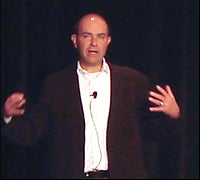 |
| Chris Anderson Photo: Eileen Bramlet |
SAN FRANCISCO — Advocates of free content have long rallied around the slogan that “information wants to be free.” But to author and Wired editor Chris Anderson, content is only the tip of the free iceberg.
“With the Internet, we created the most competitive market the world has ever seen,” he during his keynote here today at the SIIA-sponsored Software Summit. “What it says is that everything on the Internet will be available in a free version. You will compete with free or be free.”
But to Anderson — best known as the originator of the Long Tail thesis on the increasing importance of targeted, niche products and services in today’s economy — “free” doesn’t mean companies don’t make money or that consumers never pay.
“There are a lot of ways to make money,” he said. For instance, Anderson said the biggest trend on the Internet today is “freemium” — a kind of inversion of the “free sample” model: Give a basic version of a service or application away for free, but also offer more full-featured versions.
Freemium in the digital economy differs from the traditional brick-and-mortar “free sample” idea, in which a company would limit distribution of free samples based on a calculation or projection of how many they could afford to give away. But in the freemium model, a service is offered free to a majority of customers in hopes a minority will pay for a premium or added-value service.
Anderson gave social networking site Ning as one example. Ning lets anyone set up their own social network for free.
“About 90 percent use the free version; and 10 percent, the paid version, to take off ads or get extra storage,” Anderson said.
He also noted Microsoft has a program that gives startups free enterprise developer tools.
“This is marketing where people get to use the product and understand its value proposition,” Anderson said. “And because they’re brought into it, they’re happy customers because they want to migrate based on their experience already using it.”
He said a 5-percent migration to paid is a typical model that works.
“If you can get 10 percent, that’s awesome — and 20 percent is unbelievable.”
This wasn’t the first time that the free-to-paid shift has been highlighted here during this week’s the Software Summit. Red Hat’s CEO Jim Whitehurst made a similar case for customer involvement and adoption yesterday in his keynote at the event discussing the advantages of open source deployment.
“YouTube is full of crap”
Having popularized the concept of the Long Tail, it might not be surprising that Anderson sees applications of the idea everywhere. Now he sees similarities between “free,” as practiced by such firms as Google’s YouTube subsidiary and Mother Nature.
“Nature is about ‘Whatever — I’m going to scatter these eggs far and wide,'” Anderson said. “YouTube is wasting video to make it better. YouTube is full of crap — that’s what makes it great.”
Most of the user-generated hits on YouTube would never pass muster with TV network executives, he noted. He claimed most viewers don’t “love” shows like “Everybody Loves Raymond,” but it appeals to a happy medium of people who “like” it and that’s the kind of programming that drives most of primetime television.
“But what we’re most interested in is the stuff that divides us, that we love or defines us as individuals,” he added.
Anderson said new use cases and market opportunities are emerging because processing, storage and bandwidth are all becoming “too cheap to meter.”
He also noted some applications and services are designed to be free and will remain so.
“There’s a ‘gift economy,’ the stuff that’s happening online that doesn’t require money at all,” Anderson said. “Like Wikipedia and blogs that are being written for psychic rewards. Sometimes that’s more powerful than money.”
While placing a serious business bet on freemiums might seem dangerous, Anderson himself is aiming to become yet another test case.
His new book on the topic, Free: The Past and Future of a Radical Price is due out in a few months, and Anderson said he’ll use the freemium model to get it sampled online as much as possible, hoping for a successful return with 5 percent of the book’s samplers to convert into sales.
“I believe in books and want it to be read,” he added.


